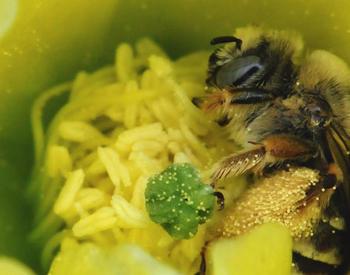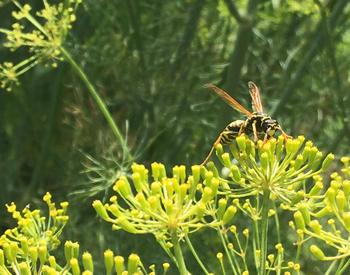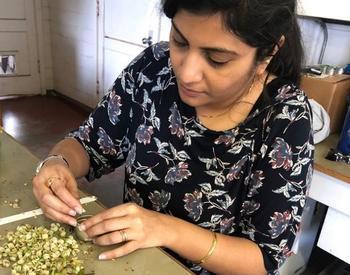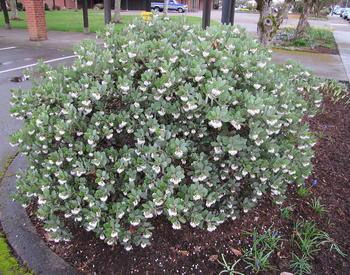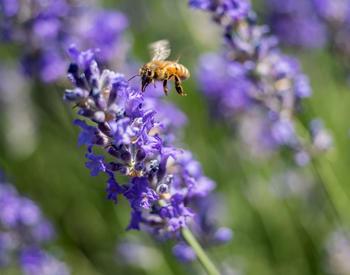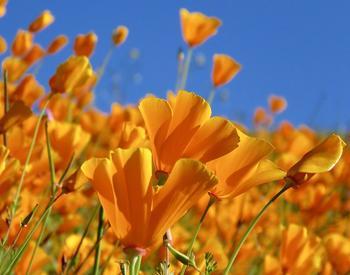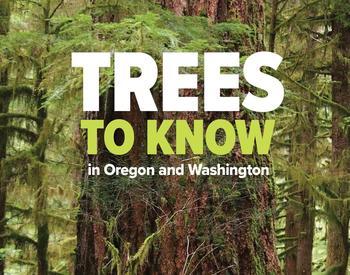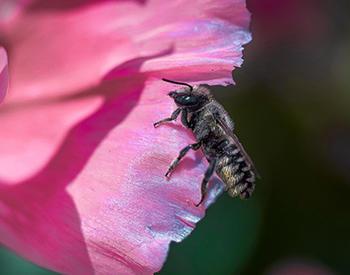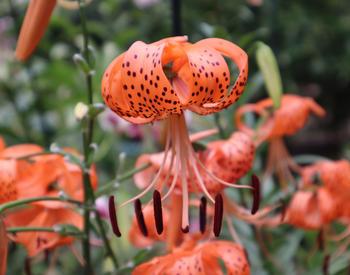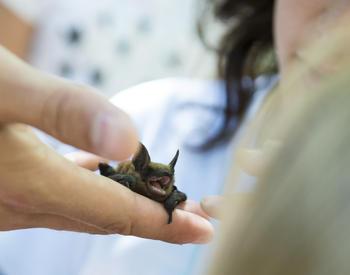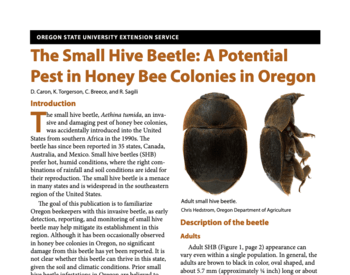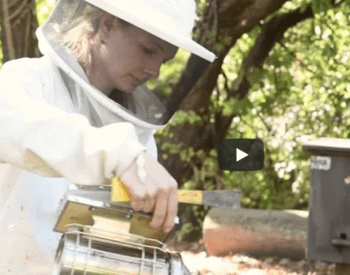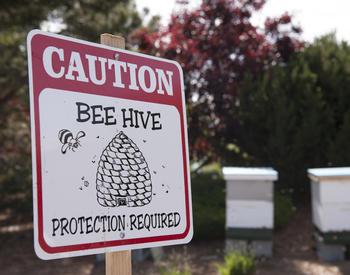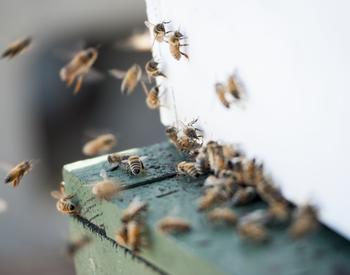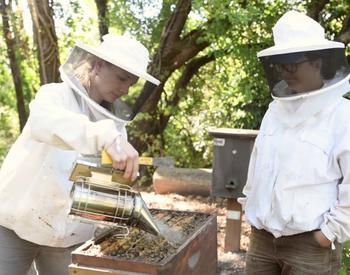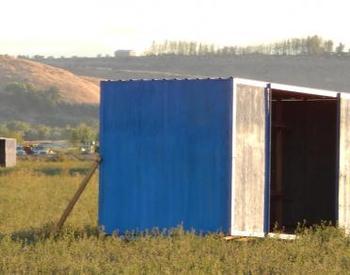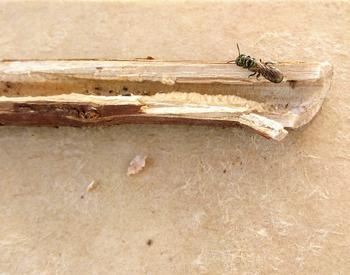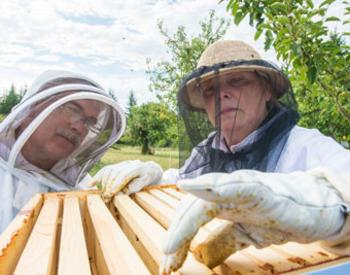Transcript
Speaker 1: From the Oregon State University Extension Service, this is Pollination, a podcast that tells the stories of researchers, land managers, and concerned citizens making bold strides to improve the health of pollinators. I'm your host, Dr. Adoni Melopoulos, assistant professor in pollinator health in the Department of Horticulture. I'm so pleased to have Jen Holt on this episode of Pollination.
Jen is the brand new coordinator for the Oregon Master Beekeeping Program, and for those of you who have taken the program in the past, you're probably really curious about who is Jen and what she likes. Well, you hear about that in the episode. Also, for those of you who are just interested in beekeeping education, how you take a regular person and turn them into a beekeeper, this episode has lots of information. Finally, as you may know, Jen is not only working with the Master Beekeeping Program but she's also co-appointed to my program, the OSU Pollinator Health Program.
So you hear a little bit about how she's thinking about combining those working, creating synergy between the two programs. Lots to talk about, plus Jen is so much fun to talk with. I hope you enjoy this episode. Well, I'm so excited today to be sitting across in my office with Jen Holt, who is the new program coordinator for the Oregon Master Beekeeping Program, but also one of us, part of the Pollinator Health Program. So welcome, Jen.
Hi, thanks. Now, you're in this new coordinator position. We're going to talk about Master Beekeeper today. And so you're the new coordinator for the Oregon Master Beekeeping Program, but you're also a former student of Master Beekeeper.
So you've been on both ends of the table, so to speak. And I wanted to begin by talking about your own experience with beekeeping education. How did you learn to become a beekeeper and what role does the Master Beekeeping Program specifically play in your overall beekeeping background? Sure.
Speaker 2: Well, it started probably about six years ago. I was reading the newsletter for the co-op times. So the co-op is our local food co-op.
Speaker 1: Oh, yeah. I'll turn it over to the co-op. Times with the T-H-Y-M-E-S.
Speaker 2: Yeah, it's like a little plug for them. So I was reading through the newsletter and I saw this little paragraph about an upcoming event that they were hosting at the co-op for the newly formed Lin Betten Beekeepers Association. And so that really sparked my interest because my whole life I've been interested in bees.
But at the time I didn't know a single person that was a beekeeper. I didn't even know where to get started. So I thought I would give it a shot and go to this meeting. And so I went to the meeting at the co-op and Carolyn was there that night.
Speaker 1: Carolyn Breeze. Carolyn Breeze. With the apoculture program.
Speaker 2: Yes, I'm assuming her position now. But at the time she was the coordinator for the Master Beekeeper Program. So she was there talking about the newly formed. Everything was brand new at this stage. The newly formed Oregon Master Beekeeper Program handed me a brochure. And I thought this was excellent. This is just what I need because you didn't have to have your own bees to be in this program. And they matched you with a mentor and that's just what I needed. So I signed up for the Oregon Master Beekeeper Program and I was assigned a mentor who is now my husband. He was my mentor. We met in the program and it just went from there. I had an instructor. I got bees that year and it just took off. So I tend to really get into hobbies that I'm interested in. I can see that.
Speaker 1: I take it way beyond hobbies. So now it's my job.
Speaker 1: Okay, great. So it was one and the same. You only know about beekeeping education through the Oregon Master Beekeeping Program.
Speaker 2: Yes. And so on the flip side for the past couple years before I took this job as the coordinator, I was the beekeeping specialist at Shenard's Nursery. So I worked with new beekeepers every single day. And most of them aren't in the program or don't have access to a mentor. And so I can see and can relate to their struggles. They want to get into beekeeping, but they don't know where to go.
They don't have any guidance. And so in my day-to-day dealings with them kind of helps me shape where I want the program to go now. But yes, for me and my own beekeeping experience, I was fortunate to I was in the inaugural class of the apprentice beekeepers.
Speaker 1: Wow. So that's kind of fun. You have street cred. Right? Yeah. Well, you know, I just want to pick up on what you just said a minute ago, because you have been through the program and you also had to teach beekeeping yourself. What are some of the things when somebody's just starting beekeeping, what are some of the anxieties and problems that you encounter? How does a program like Master Beekeepers address those issues?
Speaker 2: Right. So I think a lot of people when they're interested in bees, the first thing is they've probably never had the experience of working with bees. So they've no experience at all.
They've never seen a beehive in action. So that's probably the first challenge. Another is that they're interested in they've done a lot of reading and books. And that's great. But when you go and open the beehive for the first time or go and get your package of bees as a new beekeeper, right?
You have the book learning, but then it's like, what do I do? I have 15,000 live bees here. What am I supposed to do with this? So the program is really great for that and helping beekeepers get that solid foundation.
Speaker 1: I have to apologize. That was episode three guest, Mike Bergett, knocking at the door here at Pollinator Health. We're at the hub of everything. But you do have like you like you say, there is one thing about reading about it in a book and is another about the prospect and these bees show up and really being able to connect what you know. And I, you know, the one thing that you mentioned about the master beekeeping program was this idea of mentorship. Yes. Pairing. That's a little bit about the mentorship aspect of the master beekeeping program.
Speaker 2: Sure. So as an apprentice, you are accepted into the program with the promise of having a mentor. So that's what limits our enrollment.
Speaker 1: So the first level is this apprentice level.
Speaker 2: Yes, the apprentice level. And so we have a waiting list and it's based on how many mentors we have. For the different regions of Oregon. So like there's really high demand in Portland. So the amount of students we can take in Portland is limited by how many mentors we have in the Portland area. I see. Okay. So as an apprentice, you're assigned your own mentor and you meet with them at a minimum of four times per year.
So it's once per season. We have a field checklist with things that we think you should be talking to your mentor about and skills you should be learning and demonstrating. And your mentor will check you off on that checklist. Great.
Each season. And that's one component of being certified as an apprentice. What's on the checklist?
Things like ranges from like, can you light a smoker and keep it lit? Yeah, right. Which isn't as easy as it sounds.
No, it isn't. Ranging to what are the signs of swarming? How can I tell if my hive is about to swarm? Can you identify worker versus drone brood? Things like that. So it goes over actual physical techniques of working your hive and then observational skills as well.
Speaker 1: That's so and that bridges that gap that you talked about earlier of, you know, hear all these bees and that kind of being able to demonstrate you have that practical understanding to sort of move on to the next level.
Speaker 2: Yes, definitely. The great thing about mentors is one of the problems with beekeeping and the rise in popularity of beekeeping is that it's different from other hobbies in that there are a lot of challenges. And you can't just get a package of bees and put them in a hive in your backyard and walk away from them and leave them. You know, some people will say that, well, I'm just interested in pollination. I don't care about the honey. Yeah, I'm just going to put the bees in my yard and let them do their thing. Yeah.
Unfortunately, that doesn't work right now. As you well know, there are problems like Varroa mites and other bee viruses that are vectored by mites. We really need to have a solid foundation of education to be successful at beekeeping because sometimes people will inadvertently cause problems. By not paying attention to their bees because of mites. That could be the topic of a separate podcast.
Speaker 1: Totally. And I think in the upcoming episode, we're going to have Ellen talking about Varroa and we do need to talk. It's a timely topic. But I think I take your point. There is a way in which these things do require finesse knowledge and judgment and all of these aspects. It's not merely making a gingerbread house where you have to glue the pieces together and you have something. You have to actually work at it and learn how to do it.
Speaker 2: You do. And we want people to be successful. It's very frustrating if someone starts beekeeping isn't armed with a lot of knowledge and they're not successful. We don't want people to be turned away from beekeeping just because they don't have the knowledge to succeed. So that's our goal with the program as well.
Speaker 1: Yeah, especially in this moment when so many people are interested, it'd be great to cultivate these into lifelong activity. Yeah, exactly. That's great. Well, you did talk a little bit about this first level, the apprentice level where you're matched with a mentor and you get this basic beekeeping education. But there are other levels. Tell us about the other levels in the master beekeeping program. Yes.
Speaker 2: So just to recap, at the apprentice level you're matched with a mentor, and the goal of the apprentice level is foundational training. So you have your mentor, you have your checklists and we also provide classroom instruction. There are satellite instructors throughout the state and we also broadcast web classes from the OSU campus.
Speaker 1: So if you're in Ontario or again, you can participate.
Speaker 2: Yes, if you're out in a very remote section of Oregon, as long as you can access the internet, you can participate in the classes. Okay, great. So that's the apprentice level. Foundations and beekeeping, the journey level focuses more on self-paced learning. So we have you complete these guided studies that really get you into the beekeeping literature.
You search around in books and on websites to answer questions on different topics. Okay. Honey processing requirements. Vero Amites is one. We have one on alternative hive styles like top bar hives and Warri hives. Oh, great.
And so the topics, we're always adding new topics and you complete 12 of those. You're also tested and this is the really fun part. There's a written test, but there's also a practical exam where you're with two people who have been mentors. They're involved in the program and they test you in the field at our IP area here at OSU. And so you demonstrate that you've learned these skills and how to inspect and observe a beehive. And so that's really fun.
Speaker 1: Oh, so these colonies are probably there's some kind of trick with them. That you got to go and figure out.
Speaker 2: Hopefully, yes, because that makes it more interesting. So we'll go through and evaluate the hives before the students show up and try to pick hives with no complex problems. We don't want it to be really difficult, but you know, maybe something's a little off with the hive. And can you tell us what it is?
Speaker 1: That must be one of the exciting parts now is that you're on the other end of the table rather than having to take the test. You're the maniacal genius. To come up with that.
Speaker 2: Yes, because I've been in the hot seat. I have taken that test. Yes. That is great. Yeah, so that it's more self-paced learning and we will test you on what you've learned. But the big thing about the journey level is the service component. And so you are required to provide service back to your community. And that can be maybe you want to be a mentor yourself if you've accumulated three years of beekeeping experience. And our certified apprentice, you can be a mentor yourself as a journey-level student.
You could also write articles for beekeeping publications. We have a whole list of ways that you can accumulate service points. So we'd like for you to start giving back and using your knowledge, to give back to the community.
Speaker 1: This is great. And this mirrors in some ways the Master Gardener program or the Master Naturals program where you're really building up beekeepers, but also these people who are become really important in the state in terms of resources.
Speaker 2: Right, exactly. Because you're able to talk intelligently about beekeeping both to the public and to fellow beekeepers. So that's our goal for the program is to have someone start as an apprentice, gain the knowledge and understanding of beekeeping, and then maybe become a mentor. So the program sustains itself in that sense.
Speaker 1: Tell me, can you give me an example of an apprentice project? What kind of things would an apprentice beekeeper take on as a project?
Speaker 2: Well, the actual projects come in more at the Master level, like the research projects.
Speaker 1: The self-guided work. The self-guided work.
Speaker 2: Okay, so as a journey student, you do the self-guided studies. One of them you'd be interested in is native bees. So it will go through and ask you questions, like asking you to list some of the more well-known native bee species in your area, what they pollinate, and what kind of nesting habitats they prefer. So it gets you into the literature. It's questions you might not know right off your head. We want you to have to dig for the answer.
And they're not graded. You know, it's not a high-pressure situation, but we just want you to expand your knowledge on topics you might not have been exposed to otherwise.
Speaker 1: Okay, okay, that's great. And so I, and I, sorry, I tipped the hand.
Speaker 2: We have one more level to go. One more level we didn't cover. Yes, the Master level. And that's new as of last year. Okay. And we have seven students who are at the Master's level so far. So by that point, you're a certified apprentice, you're a certified journey, and now you're at this Master's level. The focus of the Master's level is on bee-related research. It's a kind of self-guided research.
Okay. And it's either a research topic in beekeeping or an outreach project. And the outreach project we're hoping to develop along with the Oregon Bee Project and the OSU Pollinator Health Program, which you are in charge of.
So I kind of flip the tables on you right now and ask how that could be accomplished. We have an army of volunteers. They're extremely knowledgeable. And they're looking to do these bee-related projects.
Speaker 1: So what are ways that we could collaborate? An excellent example of this would be Bob Falkner up in Hillsboro. So Bob has been doing a restoration site and he was kind enough to let me come by and install some bumblebee boxes to try and see if, you know, one prediction is you put this restoration site in place, whether those that bee community would change.
Over time. So we toyed a lot. I was really, but the thing I was really impressed with talking with Bob, as well as to people who've come through the apprentice levels, how knowledgeable they are. We had a, I had one of my first experiences here in Oregon.
I was at the Oregon State Master Beekeeping Association meeting where the master beekeepers had a program the day before and they had Alina El Nino and Tom Sealy, two really regarded bee researchers. And the apprentices went to work on them with questions and the questions were so sophisticated and so sharp. I was talking with Tom Sealy afterward and he said, I never encountered an audience like that. They were so knowledgeable and so curious. Then I think it's a really comprehensive program to warrant that kind of praise.
Speaker 2: Excellent. Yeah. So there I'm really looking for ways that we can work together because our programs have similar goals as far as education. So that's one thing that you can do as a master's student. Another thing is we ramp up the service point requirements. So there are 30 points required in the journey level. We ramp that up to 100 at the master level because we really want you to be the gold standard of beekeeping. We want you to be knowledgeable when talking to people.
And at that point, you should be in a position to give back to your community and fellow beekeepers. There's also an oral exam that you take as a master's student and you do a literature review. It's a demanding portion of the program. It can take up to three years to complete. So once you get to that level, you're the cream of the crop.
Speaker 1: I will have seven of them
Speaker 2: developing right now, percolating in the state, which is very exciting. Yeah. Yeah.
Speaker 1: Well, you know, the one thing, let's take a break, but the one thing I would like to say just in response to your question a minute ago is how excited I am that you share a coordination role across both pollinator health and the Oregon Master Beekeeping program. It really, I think there is a lot of opportunity in the public does want a lot of information on honeybees, but also other bee pollinators and it really creates some great synergy. I think when we were thinking about your position, that was one of the, you've been really great in crossing these boundaries and being involved in both. It's a really exciting new position.
Speaker 2: Yeah, it just makes sense because it seems like honeybees to me are kind of the gateway drug for native bees. So, but I see a lot of seriously, though, I see a lot of people get into honeybees and they're into beekeeping and that is a natural bridge to finding out about the native bees that are in our area. And they want to learn more about that.
Speaker 1: So I totally it's a natural partnership. Yeah, I totally agree. And I think it goes the other way too. There are so many people. There are people who are really interested in native bees, but really don't know that much about beekeeping. And it's really nice in a state like Oregon where we have master beekeepers who are really well knowledgeable and both to be able to talk to them about what's because honeybees are really weird. If you only know native bees, you'd not know anything about honeybees.
They're such a strange organism in the Oregon bee world. Yes, for sure. All right. Well, welcome back.
You know, one thing I wanted to pick up on was this. I know there are programs kind of similar to this in other states, but Oregon is a very diverse state that coming here from Canada, you go all the way from a coastal climate to a Mediterranean climate to a desert. And so beekeepers around the state and it's, you know, you got to go over these mountain passes to get there. So there is a distance issue, a regional issue in Oregon. How has the master beekeepers program been able to service these very different areas tell us a little bit about this regional element.
Speaker 2: Sure. So our program is centralized at Oregon State University here in Corvallis, but we have satellite, we call them satellite regions all across the state. So we have instructors that teach the classes at the apprentice level in different regions. So we have instructors in Hood River, Southern Oregon, Eastern Oregon, Central Oregon goes on and on.
We have. have maybe a dozen different regions. Mentors for the apprentices are located in those regions. The instructors who teach the classes are in those regions too. So we're centralized here at OSU. But if you live in these other areas, the people who are teaching the program to you are from your area.
And so we coordinate them here at OSU. But if you live in Hermiston, your mentor lives in the Hermiston area. And that's great because like you were saying, the practice of beekeeping varies depending where you live in Oregon. It's much different for someone in Corvallis versus someone in Ontario as far as weather and seasonal considerations and all of that. So we make sure that your mentor is from your area.
But like you said before, if you're in an area where you can't travel to where the classes are being held in your region, you can watch the classes online. But we record. But also, we have some branches that have formed in Washington, which is brand new. And in Idaho, so in Boise, there's this really great dedicated group of beekeepers that use us as an umbrella. So we provide the program support for them. But they have taken it upon themselves to form their own Idaho branch of the Oregon Master Beekeeper Program. So they assign their mentors and have their instructors run the program from Boise. But they're under our umbrella. And it's really great. It's like a Pacific Northwest reach.
Speaker 1: I've seen a picture of their classroom. And they just seem like a totally organized.
Speaker 2: They are. Prack.
Speaker 1: You know, they're amazing. Yeah. And we've got a group like that starting up in Washington for this next year for 2018. So that's really exciting too. OK. So that allows for something I never quite got. Because when I saw the picture of the Boise group, I saw them in a classroom. Right. So what are they? So there's the remote classroom training. But there seems to be some classroom training that takes place in the regions.
Speaker 2: Yeah, there is. So and it varies. Sometimes it's at extension offices. So if you're in Oregon, sometimes an OSU extension office can be used for classroom presentations. And we have a standardized set of presentations.
It works according to the chapters of the Beekeeper's Handbook. That's the textbook that we use for the apprentice level. But we give the instructors a lot of leeway because everyone has their levels of experience. And so we have a set kind of idea of what we want our students to learn. But the instructors are welcome to take it in any direction they wish. So it's actually in the class PowerPoint presentations. And those are optional. But if you're an apprentice student, you wouldn't want to miss that.
Speaker 1: Definitely not. Yeah. I think I remember for Idaho, for example, it's like Jan Lohman will tell me. He's like, why would you want to miss that?
Speaker 2: Why would you miss that? I would travel to Idaho to go to a class by Jan. But another great thing, too, is that we have these events. If you're a journey-level student, we have a lab day a field day, and then a journey institute that's run in conjunction with the Oregon State Beekeeper's Conference in October. And so that brings people from all over the state. So everyone's off in their little corners doing their classes and working with their mentors. But then we all come together for these events. And so you get to meet these people face to face from all over the state. So even though the program is spread out across the state, we develop this. It's a tight community, actually. You get used to seeing the same people at all the events. And you have this really close network of beekeepers, commercial and residential.
Speaker 1: I have to say it bridges this problem that I think a lot of beekeeping education programs have that are spread out. It's like you can create a very decentralized system. And I can think of some out east like that, where you may only know your mentor.
And that's really the only thing. Or you have this thing that's very centralized. I was just thinking about British Columbia, they have a master beekeeping program.
It's a five-day course. And then everybody disperses. But here it's kind of like you both have the in-context training, but then you get to come together. I think that's a really nice feature.
Speaker 2: Yeah, it is. I mean, you get that means that someone in Corvallis gets the benefit of working with someone like Jane Lohman from Eastern Oregon because they'll see her and listen to her talks at these events every year. So you have access to so much knowledge and experience in this program from all over the state.
Speaker 1: You know, I was just thinking another thing that I wanted to pick up on is the way what strikes me is a pretty unique way that maybe not for some other states. But when I was involved with beekeeping education in Eastern Canada, we didn't have this structure.
And I think it really is nice. There is a committee, a steering committee. You have beekeepers and bee educators from a variety of backgrounds, kind of presumably developing the curriculum and doing strategic planning.
Speaker 2: Yes, which it's strange because I'm the coordinator. So I get to do these fun interviews with you. But really, the brains behind this program are our planning committee. So I represent them and I answer them. In fact, we just had a meeting. We have quarterly meetings.
And our last one was this past Friday. So they came from all over the state. There's, I can't remember exactly how many people are on the committee.
It varies from year to year. But we have commercial beekeepers. We have one of the residential beekeepers on our planning committee who has 40 years of experience keeping bees. So it's a very diverse planning committee. And they are the ones who have developed and driven this program over the years. So they're service and they're all volunteers. It's amazing. This whole program is powered by volunteers.
Speaker 1: Well, that is amazing. And I really loved when I heard of that element, I really loved it. It seems like everybody has very different styles for teaching beekeeping. The common joke, no, two beekeepers have anything in common in their operation. And I think there is a way in which this really is a powerful model for kind of aggregating that and being able to reflect it into the pedagogy.
Speaker 2: And it's kind of like our built-in system of checks and balances. So it keeps us from going too far in one direction, really, really focusing on just residential beekeeping. A commercial beekeeper on the committee might say, hey, wait a second, there are aspects of commercial beekeeping that are valuable for them to learn as well. And so it kind of keeps us in the center of it.
Speaker 1: That's great. Well, the one thing I realize is that you're new to the position, but you've also been watching Master Beekeeping Yes. of the program from the beginning. Yes. So it's been a period where there's been tremendous growth in beekeeping and maybe that'll sustain itself, and it'll continue.
Maybe it's a matter of taking people who've become interested in really growing their capacities. But what do you hear at the starting point? We'll ask you this again. I'll have you back in a few years.
Excellent. We'll have you back probably in a couple of weeks. But we'll ask you in a couple of years, and we'll even play this part of the footage back so you can hear yourself.
Speaker 2: You told me accountable. That's all I'm saying today.
Speaker 1: But what do you kind of see going forward? What are some of the challenges and opportunities moving forward? Where is the Oregon Master Beekeeping Program headed?
Speaker 2: Yes. So my goal is that I want the program to truly become self-sustaining, meaning that someone who starts as an apprentice will ultimately end up being a mentor. It's never going to be a requirement to be a mentor because you really have to have that desire to be a teacher. We want you to really want to do it for your own reasons. But unfortunately, we have a very extensive waiting list that's governed by how many mentors we have. So it's my goal that each year we work further and further through that waiting list. I don't like having a waiting list.
I want everyone interested to be able to be a part of this program. The problem is that in some of these extremely rural areas in Oregon, it's just really hard to find mentors. So that's our biggest limitation. And that's my goal is to each year kind of move a little bit deeper and deeper into our waiting list. I'd also like to increase, as we mentioned before, increase the partnership between honeybees and native bees. And we have, like I mentioned, in the journey portion of the program, you're required to do these service points. And we have a list that you can choose from of all the different service opportunities. I'd like to work with you and get a comprehensive list of all the opportunities, and service opportunities that people can do to work with OSU as far as native bees and pollinators. So, my goal is to synergize these two programs and to get through the waiting list. But another challenge is having enough mentors to prevent mentor burnout.
Speaker 1: Because like I said, these are volunteers. Of course, right? And we rely on them. They're the soul of the program. But you can imagine if you're doing this on your own time and you're doing it year after year after year and you're the only person in this rural area that can do it, you can see how that, you know, we don't want people to get burned out. We want it to be fresh and exciting. So I want to build up our base of mentors so that we can maybe have rotating instructors or have some backups and really support the people that are working for us.
This seems like a complete luxury at this standpoint when you have people really eager to take the program and you have to say, well, can you please do another term and take another routine?
Speaker 2: Yes. Thanks for giving me that reality check. Yes, it's not a bad problem to have to have a waiting list. But I just want to make sure that you're really excited about something you want to jump in. I don't want to have to say sorry.
Speaker 1: Well, I've been more along the lines of like right now, you don't have that luxury. People must have some mentors who have been really working hard for a number of years just to keep up with the backlog. And it would be really nice to allow them to do other projects or exactly.
Speaker 2: Yeah. So those are some of my goals. Those are great goals. Hold me to it.
Speaker 1: Dear listeners, do you have? Right. Save this to your hard drive. OK, well, we'll take a little break and we're going to come back. We have these questions that we ask all our guests. And we're really, really, I'm personally just really curious what your answer is going to be. So let's come back in a minute.
All right, well, welcome back. And to conclude, we've got these three questions and like I said, I'm very curious what your answers are. First, we have a book. Yes, I've seen your bookshelf. There are some interesting books on there. What would you sort of if you had one or two books you really wanted people to know about or were just, you know, formative for you? What are those books?
Speaker 2: Right. So gosh, there are so many great beekeeping resources. One of my favorites, if you're looking for a technical guide to beekeeping, it's called Honey Bee Biology and Beekeeping. And that's by Dewey Karen and Larry Connor.
Yes, local. That's just a great in-depth reference. It will serve you as a beginner all the way to, you know, someone who has 30-plus years of beekeeping will find something new in that book. It's really heavy on diagrams and photographs. It's a great go-to reference. But my favorite bee book is actually called The Sacred Bee in Ancient Times and Folklore. Have you seen that one? I Hilda Ransom and it goes into all the beliefs and superstitions around beekeeping, which I'm fascinated by.
Really? By, yes, it goes through the culture of beekeeping throughout the world and across different civilizations. And that's fascinating to me because I love thinking like when you open a beehive and you hear that sound of bees buzzing and you smell wax and honey, that's the same experience that someone back in Egypt was having.
Speaker 1: It is, isn't it? It would smell the same. It would you see the same experience.
Speaker 2: And so activities like that, I'm fascinated by activities that kind of tap into that collective memory of just being a human. Yeah, you know, you get the same sensation, or at least I do, like when you stick your hands in warm garden soil gardening, it kind of triggers this connection to humans over thousands of years. And so when you're working your bees, it's neat to know that you are doing the same craft that someone way back.
Speaker 1: And it's antiquity did. It's not like bees, I don't like something else. They don't look anything like they used to look like. These are the same, you know, pretty much the same behaviors, everything that somebody would have encountered millennia ago.
Speaker 2: Exactly. They're hearing that same sound. I don't know. It's just this bridge across generations. Right. So this book, this book goes into that one more time. What's the title? The Sacred Bee in Ancient Times and Folklore.
Great. And I found it one time a couple of years ago at the beekeeper's conference. It was for sale on one of the tables and I snatched it up right away. And it's just it's fascinating. OK, so we can provide the link on your website.
Speaker 1: It definitely will. Yeah. Well, it's your website, too, you
Speaker 2: know, on my website, on our website, we'll provide the link.
Speaker 1: OK, so the second question I have for you is tools. Is there something that you use that mine should ask as listeners may know from a previous episode is my strap-on milking stool? There is nothing like going through nukes with this thing. It's got a big, boingy spring on the bottom. And in my last job, somebody actually sewed me a little cushion for it.
Speaker 2: I think I need to see this.
Speaker 1: I will show it to you one day. But that's mine. What's yours? That's great.
Speaker 2: I have three. Can I list? Yes, please. OK, so as far as a physical tool goes, it's my McCord frame grip. Are you familiar with these? It's it's like if you know, you see these frame grips that I've almost pinched or something they're used to grab frames.
Speaker 1: It's like a little spring in it.
Speaker 2: Yeah, exactly. But half the time they fall apart and they're worthless. So this one is aluminum and it has flat paddles where you grip the onto the frames. Unfortunately, the man who made these passed away a few years ago. Oh, really? His family has been making them in California for 40-plus years. So if you have one of these tools, buy a security system for it.
Speaker 1: Or send it to Jen or send it to Jen Holt.
Speaker 2: No, I think another company has started making them again, maybe. But these original tools are just a nice little family-run business. And I just use this tool every time I'm in my house. What's the name again? The McCord frame grip.
Speaker 1: McCord, MCCORD. OK, yeah. So if you have one, hold on to it. All right. OK. Yeah. So that's another tool I use over and over again is the Scientific Beekeeping website. Randy Oliver, scientific beekeeping.com. That really just I've used that ever since I began as a beekeeper. His knowledge is just incredible on any topic. It's always good reading.
Speaker 1: But we really do have to get Randy on the show. Yeah, we all will have to. But this is like, what would you talk about with him? There's like 60,000 things you get asked.
Speaker 2: I know. Yeah. So that's a treasure trove of that website. OK, good. And then my secret weapon is my husband, actually, because he has he's been keeping bees in Corvallis for about 25 years. So any question I have related to and he's a mentor in the program. So he's my sounding board, any question I have, I can run by him. I still learn things about beekeeping from him. Just every time I work with him in the bees, I learn something new. So that's my secret weapon.
Speaker 1: So you got like a lifeline if you get stumped on something. Exactly. I was like, hey, hold on a moment.
Speaker 2: I need to call someone. Yeah. So those are my those are my three favorite tools.
Speaker 1: Those are awesome tools. Those are awesome tools. We've never had, I think that you broke two two records, a website as a tool and a husband as a tool. Right. Yeah. Those are two novel ones. Good job.
Speaker 2: Neither fit in your toolkit. Right.
Speaker 1: OK, three. Yeah. The third thing is your favorite bee. It doesn't have to be a species. It can be a colony that you remember fondly or first. It can be anything.
Speaker 2: Right. Yeah. I feel like my answer is a little bit vanilla. I kind of want to say something really exotic, but the Italian honeybee is my favorite. It's the very first hive I ever looked into was a hive of Italian bees. And the first bee package that I purchased for myself was a colony of Italian bees. And to the beginner, they're just the classic bee, right? They're that light golden color, they're very mild-mannered. It's just the classic honeybee. And I think to me, that's just the essence of beekeeping is the Italian bee.
Speaker 1: Have you in your years of experience, have you ever tried other bees, and or is it? I have. And you sort of they have not met the.
Speaker 2: They're not my amazing Italian bees. Yeah, I always experiment. So I always try to keep at least one hive of Italians and then I'll experiment with others, but I find myself going back again and again to Italians, which doesn't really make sense for our area and our climate. There are better options, but they have a place in my heart.
Speaker 1: Well, it's good to know what you like. And that was the first thing that you encountered is sort of like, I think that's great.
Speaker 2: Yeah, like that day that I was going to that meeting at the co-op, that first LBBA beekeepers association meeting, a bee flew into my kitchen and just landed on my window sill. And it was like this this sign, right? And it was an Italian honeybee. It was just saying, yes, this is what you're meant to do.
Speaker 1: I'm from the Italian honeybee marketing community. I just want to introduce you to our species. I mean, our race, we're really good hard workers.
Speaker 2: Yep. So I'm sold.
Speaker 1: Well, it was such a pleasure having you come in. And I know lots of beekeepers around Oregon are really excited to be working with you. And I'm really excited to be working with you as well.
Speaker 2: Excellent. Thanks so much. Yeah, let's do this again.
Speaker 1: OK, for sure. All right. All right. Thanks so much for listening. Show notes with information discussed in each episode can be found at pollinationpodcast.oregonstate.edu. We'd also love to hear from you.
And there are several ways to connect. For one, you can visit our website to post an episode-specific comment, suggest a future guest or topic, or ask a question that could be featured in a future episode. You can also email us at pollinationpodcastatorganstate.edu. Finally, you can tweet questions or comments or join our Facebook or Instagram communities. Just look us up at OSU Pollinator Health. If you like the show, consider letting iTunes know by leaving us a review or rating.
It makes us more visible, which helps others discover pollination. See you next week.
Jen Holt is the brand new Coordinator for the Oregon Master Beekeeper Program at OSU.
In this episode, we’ll learn about how Jen got interested in bees, what she sees for the future of the program, and the ins and outs of how the program functions today.
We discuss beekeeping education from the start to the master – how to take a regular person and turn them into a beekeeper. Jen is co-appointed to the OSU Pollinator Health Program, so we talk about creating synergy between the two programs.
You can Subscribe and Listen to PolliNation on Apple Podcasts.
And be sure to leave us a Rating and Review!
“We don’t want people to be turned away from beekeeping just because they don’t have the knowledge to succeed.” – Jen Holt
Show Notes:
- How Jen learned to become a beekeeper
- Some of the things that people who are interested in working with bees worry about
- The many levels of the master beekeeping program in Oregon
- How the geographic diversity of Oregon presents challenges and opportunities
- How the master beekeepers teach the program in different part of the state
- How the curriculum is developed for the program
- How the program is powered by volunteers
- What Jen Holt sees going forward for the program
- How beekeeping connects us back to ancient times
“I would like to increase the partnership in the program between honey bees and native bees, because honey bees are often a gateway to learning about native bees.” – Jen Holt
